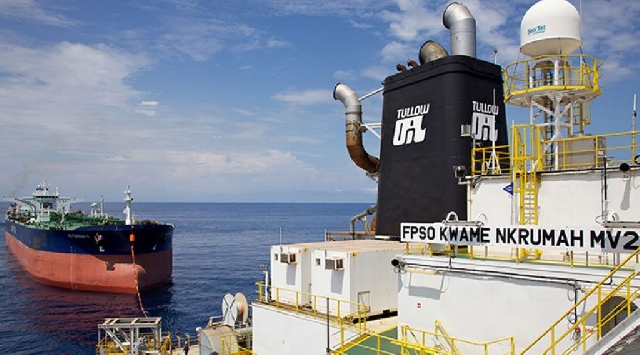COVID-19: 60 Tullow Ghana staff test positive
 FPSO Kwame Nkrumah
FPSO Kwame Nkrumah
Some 60 staff of Tullow Ghana have tested positive for COVID-19.
A statement issued by the oil company said: “Following the report of 2 positive cases of COVID-19 by Tullow Ghana on 26 May 2020, the Ghana Health Service (GHS) confirmed on Thursday 28 May that contact-tracing and testing of personnel onboard the Kwame Nkrumah (KNK) FPSO revealed 1 positive case of COVID-19. The affected individual is in good health and has been medically evacuated from the KNK to an onshore isolation facility for monitoring”.
“Also, as part of contact-tracing, GHS tested personnel on board contractor support vessel CSV Lancelot. GHS has confirmed today that 57 of the 200 personnel onboard the CSV Lancelot tested positive for COVID-19.
“All affected personnel are being brought onshore for isolation and case management”, the statement noted.
The company said its “immediate concern is for the safety and well-being of personnel and the public, and to minimise any potential for the spread of the virus”, adding: “Enhanced social-distancing is being enforced on both vessels and permanent restriction of movement between CSV Lancelot and KNK is in place.”
Tullow is not the only company in the extractive industry to have been hit by the virus.
AngloGold Ashanti recently said it had recorded a total of 196 COVID-19 cases as of 24 May 2020 at its Mponeng Mine, South Africa.
The miner, in a statement, said the full processing of tests from the COVID-19 testing initiative at its Mponeng Mine is now complete, with 651 tests completed and processed, yielding 196 positive cases.
“In the vast majority of these cases, the individuals were asymptomatic, with the balance showing very mild symptoms”, the statement said, adding: “The initiative was undertaken following the detection of a positive COVID-19 case at the mine last week, after which a comprehensive screening, contact-tracing and testing programme was embarked upon”.
It said all positive cases continue to be isolated in line with national health protocols, with on-site isolation facilities available for those who may need them.
Operations at Mponeng Mine, the company noted, continue to be “voluntarily suspended” to enable contact-tracing, further engagement with all relevant stakeholders, and deep-cleaning and sanitisation of workplaces and key infrastructure.
It said the Department of Health, Department of Mineral Resources and Energy, regional health authorities and labour unions continue to be fully engaged in the process.
The management of the mine and its medical team are working closely with the regional health authorities in “our joint efforts to slow the rate of infection and to protect those who may be most vulnerable”, the company noted.
It said Mponeng's COVID-19 risk management plans and protocols remain in place and include: appropriate screening of staff arriving at work; social-distancing measures; a cleaning schedule for designated infrastructure; hand-sanitising facilities at the appropriate locations on site, and availability of Personal Protective Equipment for employees, including gloves and face masks.
“While the company is well-placed to detect infections and to manage the social and medical responses required, it recognises that it needs to continue to play a proactive role in the community in which it is located.
“To this end, AngloGold Ashanti continues to support a range of initiatives to provide resources for healthcare providers and communities.
“This includes making two hospitals available to the health departments in the North West and Gauteng provinces for public use; a partnership to provide bulk sanitiser to state hospitals; providing handwashing stations in high traffic areas and major taxi ranks in Gauteng; distributing care parcels to vulnerable members of its host communities; procuring ICU beds; and contributing R20 million to South Africa's Solidarity Response Fund”, the statement noted.
Also, in mid-May this year, Golden Star Resources Ltd. (NYSE American: GSS; TSX: GSC; GSE: GSR) said one of its team members at the Prestea mine site in Ghana tested positive for COVID-19 following the person’s referral to the Ghana Health Service (GHS) after experiencing mild symptoms.
The affected Golden Star team member was tested and samples were processed at the government-accredited testing facility in Takoradi and now remains in isolation with very mild symptoms.
Following an extensive contact-tracing exercise, all potentially affected Prestea personnel followed the government and company protocols, including reporting for screening and testing as required, as well as subsequent isolation.
In a statement, Golden Star said the safety and wellbeing of “our employees and contractors are paramount”, adding: “We continue to proactively implement COVID-19 prevention and management controls across the business while providing available leadership, education and support to our host communities”.
“To date, we have not witnessed any material impact on production relating to the COVID-19 pandemic”, the miner said, noting: “As reported in our Q1 2020 financial results, the supply chains at the Wassa and Prestea mines have not been detrimentally impacted and both operations continue, as does the export and sale of gold doré”.
Golden Star is an established gold mining company that owns and operates the Wassa and Prestea underground mines in Ghana, West Africa.
Listed on the NYSE American, the Toronto Stock Exchange and the Ghanaian Stock Exchange, Golden Star is focused on delivering strong margins and free cash flow from its two underground mines.
Gold production guidance for 2020 is 195,000-210,000 ounces at a cash operating cost per ounce (please refer to the Non-GAAP Financial Measures disclaimer) of US$790-US$850.
As the winner of the Prospectors & Developers Association of Canada 2018 Environmental and Social Responsibility Award, Golden Star remains committed to leaving a positive and sustainable legacy in its areas of operation.
The number of COVID-19 cases in Ghana has risen to 7,616, according to the latest figures from the Ghana Health Service.
The number of recoveries has also risen to 2,421.
The death toll remains 34.
Regional breakdown
Greater Accra Region - 5,331
Ashanti Region - 1,160
Western Region - 395
Central Region - 376
Eastern Region - 117
Western North Region - 63
Volta Region - 59
Northern Region - 36
Oti Region - 26
Upper East Region - 26
Upper West Region - 22
North East Region - 2
Savannah Region - 1
Bono Region - 1
Bono East Region - 1
Ahafo Region - 0
Source: Classsfmonline.com
Trending Business

You have 120 days to raise capital to revamp operations, 2 weeks to begin salary payment – Lands Min. to FGR
16:08
Delta Airlines to serve Ghana with new Airbus A330-900neo
14:38
We need long-term macroeconomic stability to build a strong, vibrant economy – Deloitte boss
13:55
KPMG’s GH¢1bn payment claim ‘highly misleading, inaccurate’ – SML
10:39
KPMG's report confirms we haven’t been paid $100m - SML
09:50
We are committed to helping build a better Ghana - SML
09:26
SML paid ¢1bn since 2018 – KPMG audit report reveals
12:06
Recapitalisation of NIB will not solve its challenges without good corporate governance – Banking consultant
11:42
SML/GRA contract brought GH¢2.45bn in tax revenues to the state – KPMG report
10:14
Renegotiate SML contract - Akufo-Addo to GRA, Finance Ministry
09:41



